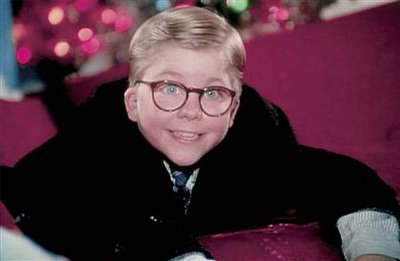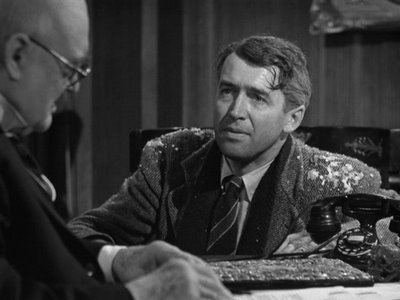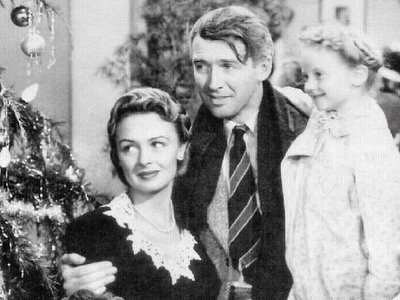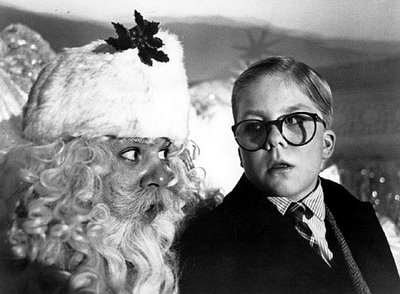In terms of decorating this blogsite with a Christmas piece, I know I'm as early as a Wal-Mart, but I want to be among the first to check in with my obvious picks for The Two Greatest Christmas Movies: It's a Wonderful Life (1946) and A Christmas Story (1983).
Let me quickly add Honorable Mentions: Miracle on 34th Street (1947), The Nightmare Before Christmas (1993) -- really more of a Halloween movie, though -- and the Chuck Jones version of How the Grinch Stole Christmas! (1966). Fine work all, but I think my two picks are the gems in the crown that shine more deeply, and tell us more about American Christmas and the thin red (and green?) line of the Season itself, than any others.
Any heft these movies possess comes from a dual source: (1) the brains of their creators--Jean Shepherd (and OK, the director, Bob Clark, who does get many things right) and Frank Capra--and (2) the faces of their protagonists--Ralphie (Peter Billingsley) and George Bailey (James Stewart).
In the Shepard/Clark movie, Christmas is bracketed and bookended by a variety of mishaps, malfeasances, and garden-variety meannesses. In fact, Christmas itself is forgotten for relatively lengthy stretches, as Flick's tongue gets glued to a flag pole -- and it hurts to watch, doesn't it? -- and Scut Farkus dishes it out (and takes it), and Randy roots among the cabbages, and a Major Award gets its fifteen minutes of fame, and lug nuts fly like sparks in the night air, while profanities bark and all of one's hard work results in a decoded "crummy commercial."
Despite these diversions, what places this movie on the list is its willingness to dip into Shepard's canon and fill out these mock-epic lives, to make us feel they deserve a perfect Christmas morning, with its granting of the wish for once --including of course an eye getting (more or less) shot out --as well as that amazing sequence that moves from innocent delight at a decapitated duck to a still and glowing and perfectly natural moment before the tree.
All of it becomes more than whimsy and farce--which good Christmas movies are wont to serve up--and more than heartstrings tugged, but an implanted memory, like all lasting family stories, retold so often the tale becomes the truth; and fiction, you need to know, is truer than fact.
Through it all, Billingsley's Hummel-figurine face, at turns beaten down by the adult world -- can anyone ever forget Santa's foot applying just the right pressure to Ralph's forehead to send him sailing down the Horrendously Happy Slide? -- and heart-breakingly confident it will all work out -- and he is right, after all -- reminds us that there is something at stake here: simply the rest of Ralphie's life, which I am convinced will take a course dependent on his foolish Christmas wish, ocular jeopardy or not.
All this, plus true hilarity, and flawless performances by Billingsley, Melinda Dillon, and that rough gem, Darren McGavin. I know you've seen this one way too many times, but I triple-dog-dare you to catch it once more between now and the Big Day, and treat yourself to a careful examination of all their faces. Not a single false note, just like a Christmas choir. As Shepard intones about the Official Red Ryder Carbine-Action Two-Hundred-Shot Range Model Air Rifle (with a compass in the stock, for some reason an ineffably beautiful detail), the movie itself becomes "the greatest Christmas gift I ever did or will receive."
As for It's a Wonderful Life, it too ignores Christmas for quite a while -- in fact, is in many ways not a Christmas movie at all. This is part of its greatness, in that Christmas is entwined in the fabric of George's story, where it becomes more than another episode, but the arena for the deciding moment in George's life. Unlike Ralphie, though, for George the moment is not the granting of a Christmas wish, but the relinquishing of a wish to be - actually, to have ever been at all. Ah, such Buddhistic bliss, to be allowed to meander off into stillness, quietude, and eventual nothingness, a cozy paradox where wakefulness is no longer required because there is no one to awaken. Like the clouds and the birds in "The Walrus and the Carpenter," one would not see George, for there would be no George to see.
Of course, George is not allowed to not be. He has lives to save, including his own. Somewhere or other, that sometimes-enlightening curmudgeon of a film critic, David Thompson, argues that It's a Wonderful Life is about the tenuousness of the American Dream, that a small sum of money can spell real ruin, and that George's violent panic, as wide-eyed and horrific as any Greek mask of tragedy, is averted only by a deus ex machina--or would that be populus ex machina, as his neighbors literally heap his salvation before him?
The moment is joyful, to be sure, but Thompson rightly points out its hysteria, with barely time to hear the bell tinkling out Clarence the angel's ascendancy. George must go on; the evidence of his necessity is too overwhelming, almost as shocking as George's earlier urge to tear it all apart.
I think, though, that this film is about something more than a close call. Like A Christmas Story, it insists that Christmas is a culminating moment, or better yet, a fitting space to work out wishes made with conviction AND in haste. For me there is something deeply attractive about the snow scenes of both movies, like Robert Frost's snowy woods--except their snow does not distract from the promises to keep, but punctuates those promises, with an exclamation point or an ellipses, and promises further promises, if you follow me. This is the faith to which these movies testify. Clarence and his twinkly eyes and all that are not where faith rests; they are cute catalysts to get George careening down Main Street, delirious, first with pain, and then joy. And as any moralist will tell you, it's always pain first.
I suppose what I love most about these two movies is their willingness to surrender to the notion that one can be both an idealist and a dope. Ralphie and George believe in what the poet G.M. Hopkins calls "the habit of perfection"; the fact that they walk into all kinds of walls because of that belief does not deter them--nor does it detract from the value of cultivating that habit in their drafty, perfect little living rooms.

3 comments:
Of course, the deus ex machina is The Deus- George's kids were not praying to the bank examiner- so we can see the "hysterical" last minute nature of the salvation as Divine Providence. God had things in hand all along, but George needed to find his faith again in order to be able to receive His help.
Forgot to sign post-it's Sherry
Yes; those calm conversations among the stars early on should not be forgotten. What happens to George is essential instruction--or better yet, revelation, so that by the end he can grin like another of God's holy fools, both student and model.
Post a Comment